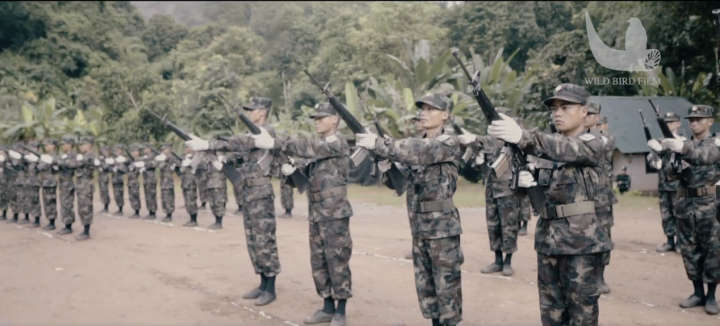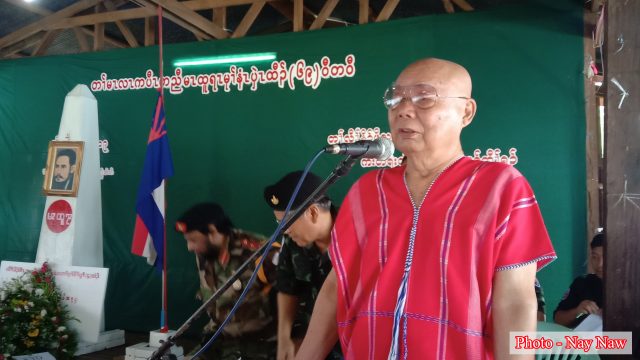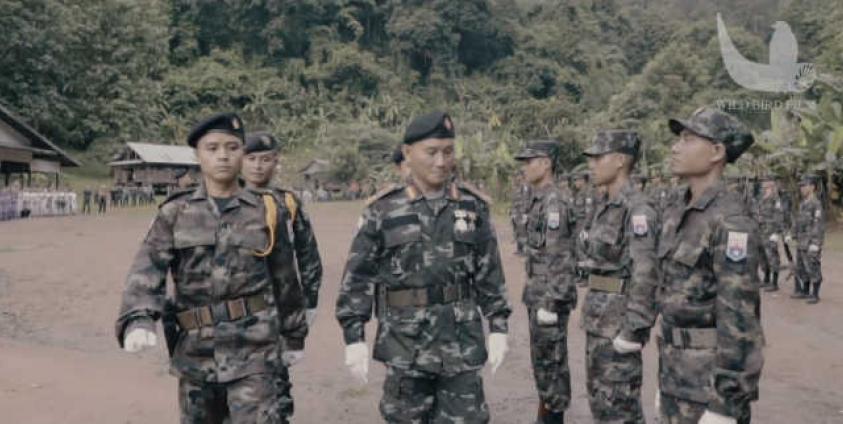Amid official warning from the authorities not to use the term “martyr” in Ayeyarwady and Yangon, on the occasion of honouring the Karen fallen leader Saw Ba Oo Gyi as “Karen Martyrs’ Day”, the Karen went ahead with holding the ceremonies using the word despite prohibition.
Karen Martyrs’ Day marks the death of the first Karen national leader, Saw Ba Oo Gyi, who was killed on August 12, 1950 by the Burma army. It was ratified by the Karen government on April 1951 and since its inception it has been commemorated annually.
Saw Ba Oo Gyi and his comrades – including General Sine Kay, Captain Lay Taw, Thara Waw Lay and eight other Karen fighters – were assassinated before dawn on August 12, 1950 in a farm hut in Toh Kaw Ko village in Karen state, according to Karen News report of August 2011.
Saw Ba Oo Gyi’s four principles are: 1. Surrender is out of question, 2. We shall retain our arms, 3. Karen State must be completed and 4. We shall decide our own political destiny.
The commemorative ceremonies of the 69th Anniversary Karen’s Martyrs’ Day were held in Pa-an, Yangon and in other places by the Karen, including Kwinkalay of No 6 Brigade of the Karen National Liberation Army (KNLA), the No 7 Brigade of the KNLA, Sonezee Myaing the headquarters of the Democratic Karen Benevolent Army (DKBA), and Htokawkoe, Sukali and Laykakawt of the Karen National Union (KNU)/KNLA (Peace Council).
In the centre of Yangon Maha Bandoola Park some 300 people gathered to celebrate the 69th Karen Martyrs’ Day which was held on August 12 Monday for 90 minutes.
During the celebration messages from KNU, political parties and civil society groups were read out, while particularly paying respect to the Karen movement founder Saw Ba Oo Gyi and Major General Sine Kay, who were killed by the Tatmadaw on 12 August 1950, to remind the younger generation of those who gave their lives in the Karen revolution and Karen history.
“Although the government rejected the use of the term “martyr,” we used it and tried to commemorate the special day. If not, we would have betrayed future generations,” said Saw Albert Cho, a member of the Yangon event’s organising committee, according to Myanmar Times recent report.

68th Karen Martyrs’ Day Bri 5 | facebook : Wild Bird
Naw Ohn Hla one of the leading organizer told the media, “When (the authorities) negotiated with me to drop the word martyr in their office, I insisted that if they can’t give sound reason we won’t change.”
Regarding the issue, KNU Concerned Group also released a statement on August 10 mentioning that such a prohibition from Ayeyarwady regional government has to be considered as the policy of national government for the whole country and it is not conducive to peace-building, national equality, ethnic rights of self-determination and building of the federal union. The statement is signed by Naw Zipporah Sein the former vice-president of KNU.
In the same vein KNLA colonel Nay Min Lwin said, “The Karen, one of the country’s indigenous ethnic groups, have been disappointed. In commemoration of the Martyrs’ Day we’re not stirring up rebellion and just following the usual procedure of 69 years. During the previous government tenure we were able to commemorate with huge people’s participation without prohibition. But in this government era our sorrowful commemoration is being heaped upon by the disappointment.”
In Hpa-an, the capital of Karen State, the commemorative ceremony was held at Thumaytaryar Makyatawya monastery building and was attended by some 500 people. The increased five-fold attendance from just a hundred last year was said to be because of the villagers participation from around Hpa-an, due to the controversial usage row of the term “martyr”, said the observers.
A participant, KNU chairman of Doopalaya district Padoh Saw Shwe Maung, made a remark, “In this era the Karen have a lot of educated people who could think and are interested and bold enough to do such things, which we should be happy,” according to Karen Information Centre recent report.

Saw Mutu Say Poe
The KNU also held the 69th Anniversary Karen Martyrs’ Day at Myawady township, KNLA Brigade 6 Kwinkalay village church where its chairman Saw Mutu Say Poe urged in a speech for unity to achieve political objectives of the Karen people.
He said, “The reason for the gathering is to pay respect to chairman Saw Ba Oo Gyi, who had sacrificed his life for the national equality and freedom of the Karen people, including Karen national leaders, patriot comrades and the people.”
He pointedly urged, “The commemoration and giving respect to the Karen martyrs will be fully meaningful by repaying them back for their sacrifices in striving for the realization of the Karen political aspirations and through standing together (unity).”
The problem with the NLD is that it follows the typical over sensitivity posture like the successive military governments with usage of words. For example, before the Nationwide Ceasefire Agreement signing the then in power Union Solidarity and Development Party government argued with the ethnic nationality revolutionary forces to drop the word “revolutionary” in addressing them and have to agree to the term ethnic armed organisations (EAOs). They reportedly gave in as they wanted to go on with the peace process.
And now the use of the term “martyr”, which the NLD is, rightly or wrongly, convinced that it belongs solely to the 19 July 1947 Martyrs’ Day, when General Aung San and his cabinet members were killed in an assassination plot by U Saw. It is a sort of monopoly mentality even with certain vocabularies. What is wrong with the Karen using Martyrs’ Day for their fallen leaders and comrades? The Bamar political leaders should not be so narrow minded.
Given such failing to understand the Karen people’s needs, values and aspirations the successive Bamar-dominated governments from military to the present NLD-led civilian-military regimes, go about suppressing the Karen national identity and spirit without calculating the ill side-effect that could hinder reconciliation and political settlement.
This goes also for other ethnic nationalities, who face discrimination and blockage in asserting their ethnic identities and cultural values by the Bamar-dominated successive governments.
It is advisable that the powers-that-be take a second look on its failed policy formulation concept, if it is really for the establishment of a genuine federal union that is in tune with a multi-ethnic state.






